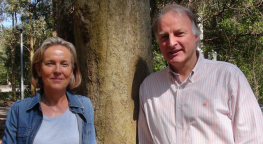
Wellbeing
By way of a weekly informed discussion, Wellbeing points to the welfare of the individual as it is influenced by the health of the community and society at large, and to how that influence feeds back.
While health can often be a neglected conversation in our media, the program provides topical information and outreach for many of the issues Australians are facing today and into the future. Produced at the University of Newcastle's 2NURFM for the Community Radio Network, Wellbeing is a growing conversation, strengthened by expert knowledge from many Australian and global authorities on all areas of health and medicine.
We caught up with hosts Graham Wilson and Virigina Reid about the origins of the program and its endeavour to Australian audiences:
Can you tell us about the origins and history of the program? What initially inspired you to start the program?
Wellbeing began in the mid-1990s when Grahame Steel, a visionary manager at 2NURFM, introduced so-called ‘lifestyle’ programs featuring experts on a variety of topics including food, gardening, finance, business, pets and health. Wellbeing was hosted by Professor Rob Sanson-Fisher, the then Dean of the Faculty of Medicine and Health Sciences at the University of Newcastle. On its doorstep, the program has access to a vast wealth of medical and health knowledge in Newcastle, and has also branched out to include such luminaries around the world as the neuroscientist Ben Carson, Bruce Lipton, author of The Biology of Belief, Norman Doidge, author of The Brain that Changes Itself, and astronaut Edgar Mitchell who, since returning from the moon, has been investigating consciousness.
Graham, can you tell us about why you initially became interested in pursuing radio production?
I was a teacher and while doing further study in order to specialise in music, I was given the opportunity to broadcast with the ABC. This was a great way to combine my love of music and to communicate with a wider audience. I appreciate the permission given to interviewers to ask a lot of questions of many otherwise inaccessible people and I’m always grateful to them for sharing their knowledge.
And Virginia, what made you decide to join the Wellbeing team?
I’ve always been interested in wellbeing per se and people who are passionate about the wellbeing of others, especially those involved in research and pushing into new frontiers, make fascinating subjects to interview. It is my absolute pleasure to attempt to bring this knowledge to others.
What are the aspects of radio as a platform that make it work so well for a program like Wellbeing?
Radio connects people – both interviewees and our audience, no matter where they are physically or on life’s journey. If we can connect with people in a meaningful way and influence their choices to enrich all of our lives, then we will have considered our little wireless program successful.
What do you see as the core aim of the program?
To inspire and empower people to use knowledge - knowledge in all its forms.
How do you decide on the subject matter for the program? Is there any interaction from listeners asking for specific issues to be discussed?
We are constantly searching current literature about wellbeing for ideas. We would love to hear from listeners about topics of interest to them and we are looking at creating a facility for collecting this information.
There’s been a lot of changes in health and medicine over the last ten year, what do you see as the most significant?
The decline in smoking rates, the vaccine for the Human Palillomavirus (HPV), and improved survival rates from breast cancer and the decreased mortality and morbidity from cardiovascular disease are all positive trends, however the increase in weight is alarming.
The program is broadcast to many rural and regional communities. Do listeners in rural and regional areas face different health issues compared to those in city populations?
Yes. The tyranny of distance is significant to these people in rural and regional areas. However, telehealth and the advances in technology have helped to narrow this gap.
Does the program reach audiences who might find it difficult to otherwise get this kind of information?
Our understanding is that the program is broadcast widely. It is hoped by being exposed to the knowledge available – e.g. Professor Stephen Ackland’s discussion on targeted chemotherapy – people will be equipped with the knowledge that enables them to be pro-active in their own management.
What does the future of health and wellbeing look like in Australia?
Because Australia has one of the best health care systems in the world and looks set to continue to be a prosperous nation, all of its population can expect first rate health care now and into the future.
For CRN subscribers:
- Wellbeing is broadcast/distributed by CRN Thursdays from 10:04 to 10:32 EST/EDT, and is available for DDN capture
- For more information contact CRN staff on 02 9310 2999 or email [email protected]
Not a CRN subscriber, but want to find out more about getting content like this for your station? Read more here.
Facebook comments